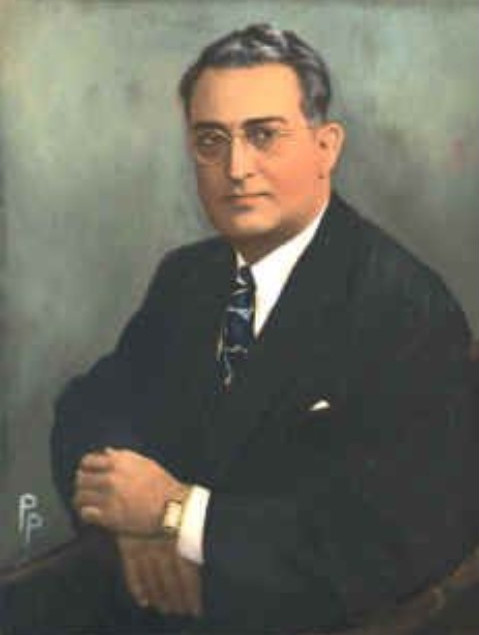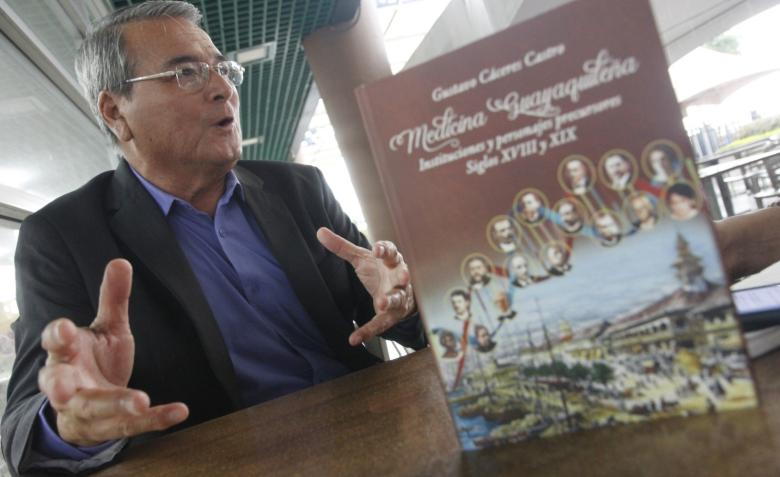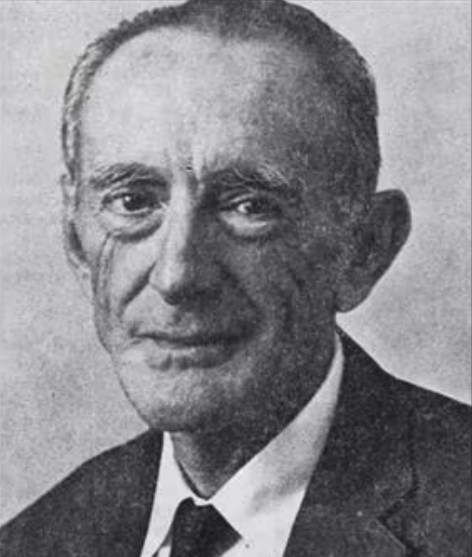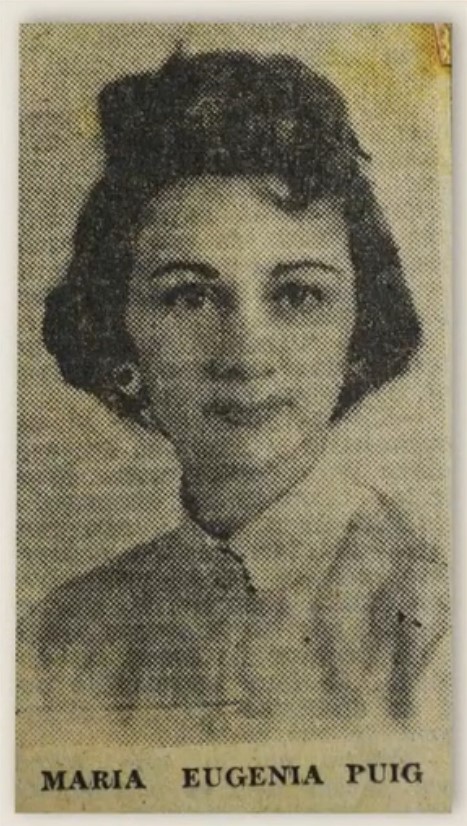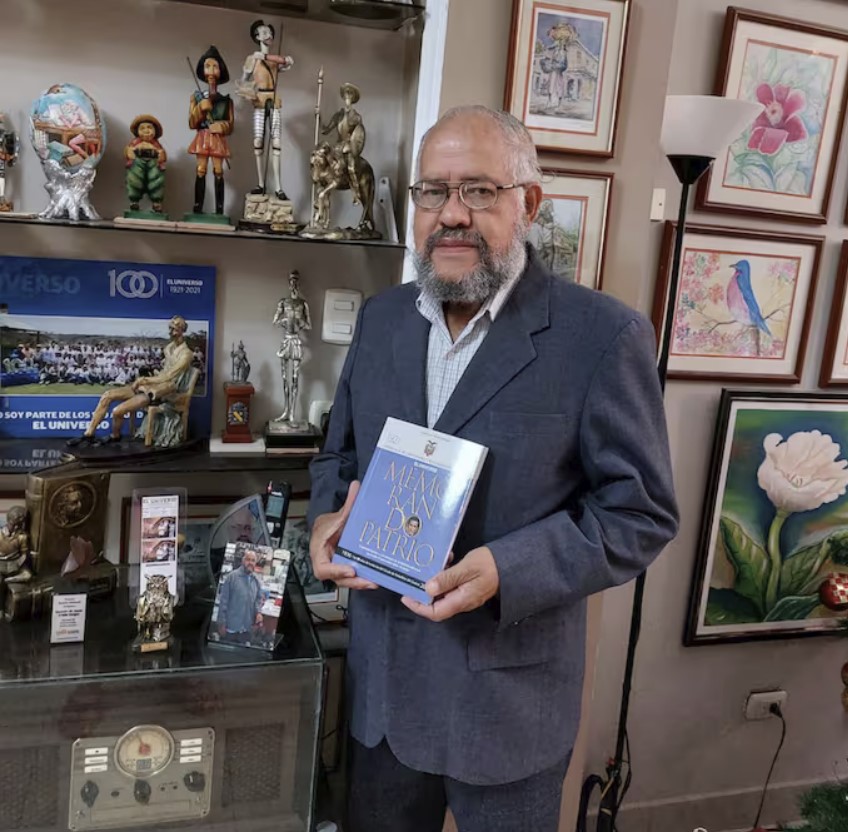Víctor Emilio Estrada Sciacaluga (Guayaquil, Ecuador, May 22, 1891 – Guayaquil, Ecuador, February 21, 1954) was a prominent Ecuadorian banker, economist, military strategist, author, and politician. The son of former Ecuadorian President Emilio Estrada Carmona, Estrada played significant roles in shaping Ecuador’s financial system, notably as General Manager of La Previsora and a key advocate for the establishment of the Banco Central del Ecuador. He briefly served as Minister of Finance, proposing the ambitious yet controversial “Plan Estrada,” and held various public service roles, including President of the Cantonal Council of Guayaquil. Estrada also made notable literary contributions, publishing influential works on economic policy and military strategy, cementing his legacy as a transformative figure in Ecuador’s history.
Continue reading “Víctor Emilio Estrada”Category: Writers from Guayaquil
Gustavo Cáceres Castro
Gustavo Cáceres Castro (Guayaquil, Ecuador, April 1954) was a prominent Ecuadorian physician, historian, and author known for his contributions to the history of medicine in Ecuador. A graduate of the University of Guayaquil’s Faculty of Medicine, he practiced at the Hospital Teodoro Maldonado Carbo and later taught embryology at his alma mater. Cáceres authored several influential works on Ecuador’s medical heritage, including Diccionario Básico de Terminología y Personajes de la Medicina Ecuatoriana (1989) and Medicina Guayaquileña (2023), which explore the evolution of medical practices and figures from the 18th and 19th centuries. His interests extended to poetry, winning him a first prize from the Municipality of Guayaquil in 1990, and his poem appeared in the anthology Cantos a Guayaquil (2011). Now retired, he remains a regular lecturer at the Archivo Histórico del Guayas, where he shares his research on traditional and scientific medical practices.
Continue reading “Gustavo Cáceres Castro”Jenny Romero Pape
Jenny Romero Pape (1930 – Unknown) was an Ecuadorian poet and cultural figure. Best known for her poetry collection La rosa de cristal (1958), she explored themes of love, solitude, faith, and patriotism. In 1968, she also published Por un mundo mejor, a work linked to Ecuadorian essays and Catholicism. Romero Pape was also active in the cultural scene of Guayaquil as a member of the Agrupación “Cultura y Fraternidad” (Culture and Fraternity Association). She wrote the lyrics for the anthem of the “Nueve de Octubre” National High School, created during a competition, with music composed by Divina Icaza Coronel.
Continue reading “Jenny Romero Pape”Patricia Velásquez de Mera
Patricia Velásquez de Mera, formerly Patricia Velásquez Villacís (Guayaquil, Ecuador, 1951), is an Ecuadorian poet, novelist, and visual artist. She began her literary career with the novel El Porvenir de Aniata (1996) and later published poetry collections such as Entre dos ríos (2001) and Mapa de amor y de dolor (2007) under her married name, Patricia Velásquez de Mera. In addition to her literary accomplishments, she embarked on a painting journey at age 45, adding a new dimension to her artistic expression. Often using the pseudonym “Dagor” for her online poetry and art, Velásquez de Mera’s work explores themes of love, existence, and human emotion, seamlessly blending her literary and visual artistry into a unified creative vision.
Continue reading “Patricia Velásquez de Mera”Efraín Pérez Castro
Efraín Leonidas Pérez Castro (Guayaquil, November 16, 1912 – May 2, 2001) was an Ecuadorian writer, journalist, and columnist. As the son of Ismael Pérez Pazmiño, founder of El Universo, he played a key role in the newspaper’s development alongside his brothers. Pérez Castro was known for his insightful editorial columns and his contributions to Ecuadorian literature, publishing works such as Prosa y verso (1960). He was also an active member of cultural organizations like the Círculo de Periodistas del Guayas and Casa de la Cultura Ecuatoriana. In 1992, he was awarded the National Order of Merit for his contributions to Ecuador’s cultural landscape.
Continue reading “Efraín Pérez Castro”Hugo Vásquez Almazán
Hugo Vásquez Almazán (Guayaquil, April 29, 1936 – Guayaquil, May 6, 2008) was an Ecuadorian priest, theologian, poet, and author of over 90 works. He is best known for his significant contributions to the Schoenstatt Movement in Ecuador. As one of its founders, he played a crucial role in spreading the teachings of Father Joseph Kentenich, whom he met personally in 1965. Father Hugo was the first Latin American priest admitted to the Institute of Schoenstatt Diocesan Priests and authored several notable works, including Nuestra contribución al cielo and Pondo: Poemas. His legacy extends into both religious and literary fields, and he was posthumously featured in several anthologies. He also served as a professor at the Catholic University of Guayaquil.
Continue reading “Hugo Vásquez Almazán”José Ayala González
José Ayala González (Guayaquil, August 2, 1885 – June 20, 1974) was an Ecuadorian poet, farmer, and public servant. Known for his romantic and nostalgic poetry, he contributed to various publications and published a collection of his works titled La Noche Avanza. Raised in a cultured and prosperous family, Ayala González spent much of his life managing agricultural estates and held several public offices, including Chief Political Officer of Babahoyo and Vice President of the Consejo Provincial de Los Ríos. His work remained within the Romantic tradition, and while newer literary movements had emerged, his poetry continued to reflect deep emotions and connections to rural life, showing a strong attachment to the past.
Continue reading “José Ayala González”Néstor Campuzano Mendoza
Néstor Campuzano Mendoza (Guayaquil, February 7, 1926 – Unknown) was an Ecuadorian poet and intellectual best known for writing the lyrics to the anthem of Universidad Laica Vicente Rocafuerte. His literary career, marked by a deep sensitivity and mastery of sonnets, earned him notable recognition, including the ‘Estrella de Octubre’ award in 1956 for his Soneto a Cristo. His works, such as Horas Milagrosas, Trigal Azul, and Elegía del Ayer, reflect a melancholic and philosophical outlook on life. He is remembered as a revered figure in Ecuadorian literature for his contributions to poetry and cultural heritage.
Continue reading “Néstor Campuzano Mendoza”María Eugenia Puig
María Eugenia Puig Lince (Guayaquil, August 2, 1919 – Quito, February 4, 2001) was an Ecuadorian poet, intellectual, and diplomat. She co-founded the Grupo Cultural “Oasis” in 1955 alongside Rosa Borja de Ycaza and Zoila Luisa Campodónico de Caputti, and served as its director, documenting the group’s activities in the magazine “Oasis.” She was also a key figure in founding the Pan-American Women’s Round Table of Ecuador, advocating for women’s cultural involvement. Her legacy is honored through the Museo Municipal de Arte “María Eugenia Puig Lince,” inaugurated in Guayaquil in 2013.
Continue reading “María Eugenia Puig”María Leonor Madinyá Andrade
María Leonor Madinyá Andrade (Guayaquil, February 15, 1936 – Guayaquil, September 7, 2006) was an Ecuadorian poet known for her deeply introspective and melancholic poetry. Despite becoming blind at the age of 22, she mastered Braille and continued her literary pursuits, becoming an advocate for the blind. Her works, such as Palpitar de un sueño (1966) and Ventana del Alba (1968), are celebrated for their emotional depth and spiritual themes. Madinyá also hosted the long-running radio program Música y Poesía, promoting poetry in Ecuador for over two decades.
Continue reading “María Leonor Madinyá Andrade”Germán Arteta Vargas
Germán Arteta Vargas (Guayaquil, Ecuador, 1940) is a prominent Ecuadorian historian, journalist, educator, and author. Known for his dedication to preserving Ecuadorian history and culture, he has published several influential works, including Guayaquil nostálgico (2009), Cantos a Guayaquil (2011), and Qué chévere (2012). His writing often focuses on civic education, folklore, and national identity. In 2019, he was inducted as a Corresponding Member of the National Academy of History in recognition of his contributions to the historical and cultural heritage of Ecuador.
Continue reading “Germán Arteta Vargas”Elías Candel Espinoza
Elías Candel Espinoza (Guayaquil, 1896 – 1983) was an Ecuadorian journalist, poet, and coplero, known by his pen name Adel Celinas. By the 1930s, his coplas were appearing in El Universo newspaper, alongside the caricatures of Virgilio Jaime Salinas and the column Los Jueves Alegres by José Antonio Campos Maingon. Over the decades, he continued writing for the paper, producing poems and verses, including a notable tribute to tennis legend Pancho Segura in the 1950s. His poem La gran fecha was later included in the anthology Cantos a Guayaquil (2011).
Continue reading “Elías Candel Espinoza”Teresa Ala-Vedra y Tama
Teresa Ala-Vedra y Tama (Guayaquil, April 2, 1889 – Guayaquil, 1987) was an Ecuadorian journalist, poet, writer, painter, pianist, and composer. She co-founded the literary magazine La Ondina del Guayas (1907-1910), which provided a platform for women writers to express themselves through poetry, essays, and articles. Known for her artistic versatility, Teresa also excelled in watercolor painting and music composition, contributing significantly to Ecuador’s early feminist literary movement. Her work spanned various creative forms, including drama, with her children’s play En el jardín de los enanos published in 1956.
Continue reading “Teresa Ala-Vedra y Tama”María Leonor Baquerizo
María Leonor Baquerizo Díaz Granados (Guayaquil, 1960) is an Ecuadorian writer, professor, and empowerment coach. She is known for her contributions to Ecuadorian literature, particularly in the genre of short stories, where she explores psychological themes and human emotions. In addition to her literary work, she teaches at the Universidad Católica de Santiago de Guayaquil and ITS, and directs programs at Empowerment Coach Consultant. Her works, such as “Solo quería entender” and “Las grandes cosas se pierden en la niebla”, have earned her recognition as a significant figure in Ecuador’s literary scene.
Continue reading “María Leonor Baquerizo”Martha Chávez
Martha Chávez Negrete (Guayaquil, 1967) is an Ecuadorian doctor, psychiatrist, and writer. She is known for her contributions to contemporary Ecuadorian literature, particularly in the genres of short stories and novels. Her notable works include Precisando el sentido (1999), Uno de estos tristes días virtuales (2003), and her acclaimed novel La memoria corre a mil (2008), which won third prize in the genre of novels for its exploration of memory and identity. In addition to her literary career, Chávez is also a university professor and a contributor to various literary magazines in Ecuador.
Continue reading “Martha Chávez”
